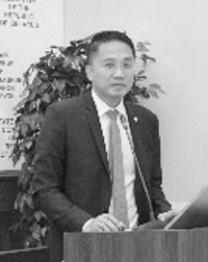NTFC Panel: Private Sector Participation Crucial for Successful Trade Reform
|
Key stakeholders from throughout the international trade space came together Wednesday to share best practices and lessons learned for ensuring that the private sector plays an active part in shaping trade facilitation reform. The 90-minute discussion, held Wednesday during UNCTAD's National Trade Facilitation Committees Global Forum 2022, featured NTFC representatives from both the public and private sectors. During the session, panellists reflected on the vital role of public-private partnerships in trade facilitation reform and how National Trade Facilitation Committees serve as a bridge to maintain and deepen trust and collaboration between both sectors. Participants acknowledged that while NTFCs receive their mandate from the government, the private sector is crucial in identifying and driving trade reform priorities. Establishing and maintaining active and ongoing participation by a diverse range of businesses and associations in NTFC working groups was touted as a key to achieving more effective and innovative trade facilitation outcomes. Among the other recommendations discussed by the group: the need for clear commitments from the government, having the willingness to delegate responsibility to practitioners and empower them to make decisions, and being flexible and remembering that no one size fits all. Different countries and cultures require different approaches to public-private partnerships. It was also noted that in addition to the time and cost savings businesses enjoy, trade facilitation provides a clear incentive for governments in the form of enhanced revenue collection and improved compliance with customs regulations. Participants included Robin Reese, Advisor to Norwegian Customs, which is Norway's NTFC Secretariat; Zafivanona Ernest Lainkana, Director General of Madagascar Customs; Davilyne Busuru, Policy and Regulatory Compliance Analyst for the Kenya Private Sector Alliance; Chea Samnang, Deputy Director of Cambodia's Department of International Customs Cooperation and Chairman of the National Committee on Trade Facilitation; Andrew Hudson, partner at Rigby Cooke Lawyers in Australia and Chair of the NCTF Private Sector Group; and Bharat Joshi, CEO of J-Curve Ventures in India and Co-Chairman, CII National Committee on Shipping and Logistics. The panel session was co-organised by the Global Alliance for Trade Facilitation and moderated by Valerie Picard, Deputy Director of the Alliance. |
Watch the session:
Taking stock and accelerating public–private partnerships for trade facilitation reform
Trade facilitation reform is most successful when there is a strong National Trade Facilitation Committee operating in the country that is representative of the full range of stakeholders in the international trade space.
An NTFC is a key component of the country’s overall trade and economic development ecosystem, and a representative NTFC is one that actively incorporates the private sector into an NTFC’s strategy, working groups, and activities.
This session will invite stakeholders from a range of countries to share best practices and lessons learnt on inclusion of private sector into the NTFC. It will ask panelists to reflect on how NTFC’s can further strengthen the role of private sector in implementing the TFA in years to come.
Robin G. Reese holds a master’s degree in Political Science and a bachelor’s degree in European studies from the University of Oslo. He has previously worked at the Norwegian Embassy and Delegation to the UN/IAEA in Vienna, at the German-Norwegian Chamber of Commerce in Oslo and at Innovation Norway in Hamburg.
Since 2019, Robin G. Reese has worked in Norwegian Customs with Norway and EFTAs Free Trade Agreements related to Rules of Origin and Trade Facilitation, as well as the Generalized System of Preferences of Norway and the National Trade Facilitation Committee of Norway.

PhD in economics from University of Antananarivo
2008 : part of the public administration – Customs inspector
2019 : appointed as Madagascar Customs Director General
Languages : Malagasy , French and English
Values : integrity, accountability , professionnalism

He is a versatile Policy Analyst in a private sector apex body with over 7 years’ experience in private sector development. Curently, he is the the Policy and Regulatory Compliance Anlayst at Kenya Private Sector Alliance (KEPSA).
He has also worked for the Delegation of German Industry and Commerce-Kenya and Consulted for the International Trade Center as a Master Trainer of Trainers on the WTO TFA. I have also been previledged to to manage projects funded by the African Development Bank, Trade Mark East Africa (TMEA), the Center for International Private Enterprise (CIPE), the USAID through East Africa Trade and Investment Hub and Development Alternative Initiative (DAI) through the Kenya NIWETU project.
He holds a Master of International Trade and Development from the University of Adeliade, South Australia.

CHEA Samnang, Deputy Director of International Customs Cooperation Department, have been working for Cambodia Customs for 15 years mainly on Customs Valuation, multilateral cooperation, the implementation of WTO TFA and negotiation and implementation of FTAs. He was recently recognized as WCO accredited expert on RKC and Mercator Programme Advisor on WTO TFA in 2019.
He is also working for the Supreme National Economic Council. He contributed his research on labor market, Cambodia Vision 2050, rectangular strategy of the government and policy framework of the digital economy of Cambodia. Before joining Customs, He has four year experiences as Economist Researcher, Head of globalization and economic integration research program at the Economic Institute of Cambodia.
He has written many articles about the economic affects of Cambodia’s accession to the WTO and Customs Procedures, some of which have been published in the Yale Journal and the Cambridge University Press. He taught the Trade Policy Review Course co-organized by WTO and Hong Kong University. He is currently remote Ph.D. Candidate at Adelaide University with Research topic on “Globalization, Uneven Growth and Human Capital Development: Case of Developing Country”
Andrew is a Partner in our Customs and Trade team, with significant expertise across the international trade law and customs.
Andrew is a trusted and highly-regarded industry adviser to businesses, industry associations, other peak bodies and government, and regularly consults on legal and trade developments that affect Australian and international businesses.
He assists importers, exporters, licensed customs brokers, freight forwarders, shippers, marine insurers and trade financiers, and other industry parties with procedural and legal advice, including reviews and litigious matters. This advice is provided in Australia and overseas, where Andrew works with a network of colleagues at law firms across the world.
Andrew specialises in all areas of trade including international trade conventions, dispute resolution and arbitration, trade financing options, commodity and freight contracts. He represents his clients’ best interests during inquiries or prosecutions by government agencies, in matters involving dumping and alleged underpayments of customs duty, alleged breaches of licence conditions by service providers (such as licensed customs brokers), biosecurity and defence control issues along with any associated litigation.
Andrew is a member of the board of directors of the Export Council of Australia (ECA) and the Food and Beverage Importers of Australia (FBIA) and is regularly engaged in these capacities to engage with the government agencies and peak industry bodies operating across Australian borders. Andrew is also the Chair of the Private Sector Group at the National Committee for Trade Facilitation (NCTF) and the International Trade Remedies Forum as well as their sub-committees and advisory groups.
Bharat serves on the boards of three companies of the Joshi Group as executive Director. All three companies have interests in logistics, technology and infrastructure:
- ACTL (Associated Container Terminal Ltd (http://www.actlindia.com) established the first private Dry Port in the hinterland of India;
- JKTI (Joshi Konoike Transport and Infrastructure (http://www.trac1.in) is an Indo-Japanese joint venture with the Konoike Group (Estd. 1880) that owns and operates private freight trains; and
- J-Curve Ventures Pvt Ltd (www.jcurve.in ) was set up to (a) invest in new technology and businesses, (b) advise foreign companies and trade missions on India and (c) form alliances to pursue opportunities and projects in India and the region.
He serves on the National Council of CII (Confederation of Indian Industry), as Vice President of NACFS (National Association of Container Freight Stations), is a charter member of TiE (The Indus Entrepreneurs), Delhi Chair of the INZBC (India-New Zealand Business Council).
Bharat writes for print and online publications and authored Navigating India: a socio-economic commentary and guide for business in India.






